Legal Expert Hearing on Plasmidgate: Everything You Need to Know
The time for justice is NOW! Important insights and information from Monday's 4-hour expert hearing on the legal implications of plasmid DNA in C-19 mRNA vaccines.
Written by World Council for Health Correspondent Alice Ashwell, PhD.
The World Council for Health’s Urgent Expert Hearing on contamination of the Covid mRNA shots with bacterial DNA on 9 October 2023 was a shocking expose. The presence of undisclosed genetic material raised all manner of questions and issues.
Are these sequences incorporated into the human genome? Could the SV40 promotor sequence be responsible for the spate of rapidly developing cancers being reported post-injection? Does this mean that the shots (and possibly even those who have received them) can be considered genetically modified organisms (GMOs)? And what are the ethical and legal consequences of these discoveries?
To explore the legal implications, WCH convened a second Urgent Expert Hearing on 27 November 2023, bringing together an international panel of mainly legal experts who have been involved in Covid-19-related cases to discuss legal insights and responses to these issues.
The session, moderated by WCH Steering Committee members Shabnam Palesa Mohamed and Dr Mark Trozzi, heard from the following panelists:
Fahrie Hassan (South Africa), a molecular biologist with a master’s degree in chemical pathology, was the only non-legal member of the panel. Since the early days of Covid-19, he has been investigating and exposing the intricate web of relationships – in particular conflicts of interest – incentivising and enabling those who continue to profit from the ‘plandemic’.
Katie Ashby-Koppens (Australia), a civil litigator who has been involved in some of the largest class actions in Australia. She has recently filed an injunction application against Pfizer and Moderna, alleging that the Covid-19 products satisfy the definition of GMOs.
Julian Gillespie (Australia), lawyer and former barrister who has been researching and preparing legal opinions and briefs relating to many aspects of the Australian government’s response to Covid-19, including the injection of babies and children; employer vaccine mandates; the failings of the Australian Health Practitioner Regulation Agency (AHPRA); and avenues for legal redress.
Peter Fam (Australia) is a specialist human rights lawyer at Maat’s Method, Australia’s only non-government-funded human rights law firm. His goal is to defend and advocate for the inherent dignity and rights that every man or woman holds by virtue of their humanity, and he focuses among other areas on tort law, administrative law, and international human rights.
Sue Grey (New Zealand), a lawyer specialising in complex emerging human rights, medical, legal, environmental, and risk allocation issues, who led a successful Covid vaccine challenge in May 2021. She is co-leader of the New Zealand Outdoors and Freedom Party and was co-leader of the Freedoms New Zealand umbrella during the 2023 general elections.
Wendy Low (Singapore), an intellectual property (IP) lawyer, worked at one of the largest law firms in Singapore and Southeast Asia. She was profiled as one of the 50 IP litigators you should know in the Asia-Pacific region. Wendy specialises in dispute work covering IP, technology, employment, and health sciences.
Dr Willem van Aardt (USA), an extraordinary research fellow specialising in international human rights and constitutional law, and founder and CEO of Finbond Group Ltd. His doctoral research focused on State responsibility for human rights abuses committed by non-State actors under the Constitution. He is the author of the book Covid 19 Lawlessness and numerous legal articles relating to the violation of fundamental human rights during the Covid-19 pandemic. You can find a chapter of this book on the WCH Substack.
Plasmidgate: Avenues for Law, Justice, and Human Rights
Shabnam Palesa Mohamed welcomed the panellists, noting that while the fields of health and science continued to provide evidence of fundamental human rights violations caused by the Covid-19 shots, it was the role of law and justice to ensure transparency, accountability, and reparation.
She reminded us of Big Pharma’s history of profiting from misery, including the rollout of the Gardasil vaccine that caused deaths in India, and HCG (masquerading as tetanus shots) that resulted in infertility among women in Kenya. Big Pharma is also no stranger to litigation, with companies having paid billions of dollars in settlements relating to numerous cases including, for example, the opioid crisis, false promotion of drugs, kickbacks to doctors, and failing to report on safety concerns.
Dr Mark Trozzi sketched the context of the discussion, with a review of Covid crimes, and a summary of the expert panel on DNA contamination. He trusted that the Law and Justice Expert Panel would provide guidance in terms of strategies and actions to halt the rollout of mRNA injections, punish the perpetrators, and restore human rights and the rule of law to all people.
Here are some highlights from the presentations:
Rulers of the World: Covidgate Conflicts of Interest — Fahrie Hassan
Fahrie has made it his business since the beginning of 2020 to ‘follow the money’ that has been the real lifeblood of the Covid phenomenon. His research has uncovered that the major Covid-19 stakeholders have serious conflicts of interest. His presentation slides are fascinating, revealing not just the major funders invested in the evolving global reset, but the tangled, conspiratorial web connecting the major players.
Many people reject the idea that the events of the past few years are the result of a ‘global conspiracy’. Unfortunately, the caricature of shadowy figures sitting around a table in a smoke-filled room planning our future has tended to put people off investigating what Fahrie refers to as a ‘Global Public-Private Partnership’. Operating via a policy hierarchy these highly influential players have indeed been gaining increasing control over people worldwide. The ‘Policy Makers’ who meet regularly at international gatherings such as the World Economic Forum (WEF) set the agenda, which is then enacted via a wide range of ‘Policy Distributors’ – including many international non-governmental organisations (INGOs) such as the UN, WHO, and World Bank. Governments and regulators are the ‘Policy Enforcers’ that are aided and abetted by the ‘Policy Propagandists’, the legacy and social media, as well as a plethora of ‘fact checkers’. At the bottom of the pile, the ‘Policy Subjects’ (you and me) are expected to do as we are told.
The WEF is an important nexus in the Plasmidgate story. Indeed, its chairman Klaus Schwab is notorious for having stated that, “The pandemic represents a rare but narrow window of opportunity to reflect, reimagine, and reset our world.” WEF partners are leading global companies that are powerful driving forces in shaping the future. One of the most formidable individuals is the CEO of BlackRock, Larry Fink, who is not only on the Board of WEF but was also appointed by the Biden Administration to oversee the Federal Reserve.
Fahrie reveals through his slides that the process currently taking place to amend the International Health Regulations (IHR) is a key aspect of the Global Health Security Agenda, which in turn is part of Agenda 2030. The role of major donors and investment houses, from the Bill and Melinda Gates Foundation (BMGF) and Wellcome, to BlackRock and Vanguard, who fund the individuals, officials, and organisations at all levels of the policy hierarchy, cannot be under-estimated.
Fahrie’s numerous conflicts-of-interest diagrams are a resource that illuminates the extent to which Big Money has captured many aspects of our lives. In the hands of legal experts, they can become a powerful tool.
International Human Rights Law & the Voluntary Consent Criterion — Willem van Aardt
On the back of countless assurances by manufacturers, public health agencies, and the World Health Organization (WHO) that the Covid ‘vaccines’ were ‘extremely safe’ and ‘highly effective’, citizens were required to sign informed consent declarations before getting their shots. From the outset many people were concerned about the contents of the mRNA injections, which had not been made public. Since then, the discovery of plasmid DNA contamination has confirmed that these shots should never have been described as safe.
Van Aardt provided an International Human Rights Law (IHRL) perspective, focusing on the informed consent criterion and the egregious violations of the International Covenant on Civil and Political Rights (ICCPR).
IHRL sees individuals as the main subjects of international law. A fundamental principle of international law is the jus cogens or peremptory norm; this is accepted by the international community as a norm from which no derogation is permitted. Thus, a State Party cannot ignore the obligations imposed by a jus cogens norm, which also limits the ability of the State to craft contradictory legislation.
Article 7 of the ICCPR explicitly determines that “no one shall be subjected without his free consent to medical or scientific experimentation,” such as the experimental Covid-19 ‘vaccine’. No derogation may be made from this Article, even in times of a public emergency that threatens the life of the nation. Medical experimentation without free and informed consent is viewed in a class similar to the prohibition of slavery and torture from which no derogation is allowed. Covid-19 vaccine mandates significantly infringed on the individual's right to medical self-determination in violation of Article 7 of the ICCPR and IHRL jus cogens norms.
The following agreements, which set norms and standards for bioethics, explicitly reference the voluntary consent criterion:
The Nuremberg Code 1946
The World Medical Association’s Declaration of Helsinki 1948
The Universal Declaration on Bioethics and Human Rights 2005
The World Health Organization's Guidance for Managing Ethical Issues in Infectious Disease Outbreaks 2016.
Three essential requirements are needed to meet the voluntary consent criterion. In each case, an example is given of how these were not fulfilled:
freedom from coercion and pressure, e.g. ‘no jab, no job’
informed and educated consent, including the absence of false and misleading information, e.g. the ‘safe and effective’ falsehood
a healthy psychological state, e.g. not the mass delusion created by the Covid narrative.
With reference to the third criterion, the term ‘menticide’ has been used to describe the mass delusion of a nation subjected to large-scale government propaganda designed to influence emotions, motives, objective reasoning, and behaviour. There are clear similarities between what occurred in Nazi Germany and the Covid phenomenon. In this case, the transnational pharmaceutical industry, governments, public health authorities, and other political and financial profiteers manipulated the public into getting injected with an experimental Covid-19 injection.
To contend that citizens were able to give ‘informed consent’ to the experimental Covid-19 vaccines (while at the same time not disclosing known plasmid DNA contamination and potential harmful side effects) is preposterous and makes a mockery of medical ethics and the law. There needs to be a substantive judicial reckoning at both national and international levels with all public and private officials who violated International Human Rights Law.
Poisoning the Well of Humanity: Human Rights Implications — Peter Fam
“We are here to consider the human rights implications of the well of humanity
being tempered with and possibly poisoned.”
Like Dr Van Aardt, Peter Fam focused on the international context, observing that all countries represented on the panel had covenanted into seven key UN agreements that enshrine human rights.
In addition to the International Covenant on Civil and Political Rights mentioned previously, he emphasised a lesser-known treaty, the Universal Declaration on Bioethics and Human Rights, which is the most relevant modern human rights treaty for the issues under discussion, as it enshrines the general principles of bioethics.
Article 6 has to do with consent, emphasising that free and informed consent of the people concerned in any medical intervention is necessary and must be based on adequate information. Furthermore, “In no case should a collective community agreement or the consent of a community leader or other authority substitute for an individual's informed consent.” This means that a politician or a government cannot substitute some ruling or order or direction over an individual's fully informed and free consent.
Article 18 deals with decision-making and addressing bioethical issues, and states that, “declarations of all conflicts of interests and appropriate sharing of knowledge” should be promoted. In this regard, Fahrie Hassan’s research into conflicts of interest is of great value.
It is hard to believe that it has taken less than four years for the world to turn away from these agreements that enshrine some of the very best values and intentions of the human family. As Peter observed, this Declaration has been completely bypassed and ignored by the profit-hungry transnational pharmaceutical corporations responsible for this iatrogenic catastrophe, and by the governments who have guaranteed their indemnity.
Comparing the GMO Acts of Australia & Other Countries —Julian Gillespie
Julian has been researching opportunities for legal recourse to the mRNA shots in various jurisdictions. By October 2022, he had determined that they could be defined as being or containing GMOs.
Very similar definitions are found in GMO Acts around the world and have been in existence for approximately two decades. The LNP-modRNA (and the recently discovered LNP-modDNA) complexes fulfil the definition of GMOs. In the UK regulation, for example, the term ‘micro-organism’ is defined as an “entity, cellular or non-cellular, capable of replication or of transferring genetic material”. Essentially, these complexes are a new form of synthetic virus “capable of transferring genetic material.” The LNP part of these complexes carries the genetic material throughout the human body and transfers the genetic material across the cell membrane of all cell types. Finally, these complexes fulfil the part of the definition which requires that they must be artificially modified.
As pointed out by Katie Ashby-Koppens (below), Australia’s Gene Technology Act requires that a licence be obtained to approve the importation, transport, and marketing of a GMO. This requires a significant risk assessment to prove no environmental damage, as well as consent from the Secretary of State. However, Julian discovered that in the UK the manufacturers managed to avoid having to obtain a licence by instead applying under the Human Medicines Regulation 2012, which did not require this information.
Julian comments on the absurdity of this loophole:
“So we've got a situation where, in the UK, if you wish to get marketing approval for a GMO that you're going to spray on plants everywhere, you have to go through this extensive risk assessment process and receive consent. But If you're going to inject it into humans you don't have to disclose it, which is absolutely remarkable.”
In a case of regulatory complicity, the European Medicines Agency (EMA) required a GMO risk assessment but flouted their own regulations by not disclosing that the shots were GMOs. They therefore allowed Pfizer and Moderna to avoid the obligation to disclose to the public.
The USA also used a technicality to avoid an environmental assessment, as a manufacturer does not have to provide an environmental assessment with respect to the GMO aspects of the drug in a new drug application if the action does not increase the use of the active ingredient.
After all the chaos caused by the injection of these GMOs into billions of people around the world, Julian points to a comment on X from a thread by Kevin McKernan that questions why it was necessary at all to use GMOs in the Covid shots:
“I've yet to see a reason why Spike wasn't created in vitro then injected. Why was gaining access to the cellular machinery so important?”
Kevin McKernan replies that had this been the case, vaccines would not have been needed at all, as this could have been delivered by a nasal spray.
David v. Goliath: A Lawsuit against Pfizer & Moderna — Katie Ashby-Koppens
In Australia, Katie Ashby-Koppens is working on a case directly related the discovery of DNA contamination of the mRNA shots. The plaintiff intends suing Pfizer and Moderna in Federal Court and is seeking an injunction to stop them dealing with the products because they contain, or are, GMOs. The manufacturers also failed to apply for the appropriate licence to deal with GMOs in Australia.
Katie illustrated how definitions in the Gene Technology Act 2000 allowed her to formulate the main arguments of the case, namely that the lipid nanoparticle (LNP)-mRNA complex is an organism capable of transferring genetic material through the process of retro-position, and that the recently discovered LNP-DNA complex is an organism capable of transferring genetic material in multiple ways.
Fortuitously, in a recent Senate hearing, the Gene Technology Regulator made a statement confirming that gene technology was used in the modification of the mRNA, thus the LNP complexes satisfy the definition of a GMO.
Pfizer and Moderna are therefore ‘dealing with GMOs’ and, according to the Gene Technology Act, they are required to apply for a licence. This was not done, and according to the Act this is a criminal offence. A criminal brief was, however, declined.
To find out more about progress with the current case, see regular updates on their Give Send Go GMO page.
Finding Ways to Litigate in Singapore — Wendy Low
Wendy has been exploring various avenues for litigation in Singapore largely focused on employment issues relating to the Covid measures. She has pursued four possible aspects of the legal response: the constitutional right to life, liberty, and livelihood; legal immunity; informed consent; and countering falsehood.
Article 9 of Singapore’s Constitution states that “No person shall be deprived of his life or personal liberty save in accordance with law.” Despite this, it has been difficult to apply the law to benefit those negatively impacted by the Covid regulations, such as the ‘no jab, no job’ policy. In this case, for instance, the High Court found that this policy could not be subjected to judicial review.
Furthermore, case law in Singapore interprets the clause on personal liberty in the Constitution very narrowly, ignoring concerns about health freedom and focusing only on unlawful incarceration or detention. The Constitution is also silent on the right to livelihood.
Rather than relying on the Constitution, therefore, it has been necessary to draw on case law; but even this is complicated. Currently, the hearing of a case of a medical employee is due for January 2024. It draws on Singapore’s Employment Act, which states that “an employee may terminate his contract of service with his or her employer without notice where the employee or the employee's dependent is immediately threatened by danger to the person by violence or disease that the employee did not by his contract of service undertake to run.” An illegal term or contract of service is that which, “… provides a condition of service which is less favourable to an employee than any of the conditions of service prescribed by this Act.” Termination of an employee for non-vaccination on the assumption that s/he can pose a threat of disease constitutes a term which is less favourable than “any of the conditions of service prescribed by the Act.” The argument pending a decision before the tribunal is thus that such a term should be illegal and void.
Wendy is also looking to test tort law and what that protects. An aspect that has been largely unexplored in Singapore is the idea that the law of tort protects the integrity of the body. The function of the tort of battery is to protect bodily integrity, as it is about the right to determine what can be done to the body. Information about the Covid vaccine is lacking due to censorship, so she is looking to test the right to have full awareness and knowledge, and to determine what can be done to his body.
Other potential avenues include claiming compensation for vaccine injury in terms of the Work Injury Compensation Act, or from the Vaccine Injury Financial Assistance Program. However, as of March 2023 there have been only 18 payouts suggesting that there is very little recognition that injuries can be directly linked to the Covid 19 vaccine.
According to the Singapore Medical Council’s Ethical Code and Ethical Guidelines patients have a right to informed consent. This information should include safety information such as the contents and contamination of the Covid shots. Doctors should be able to access this information and not rely on what is provided officially. Furthermore, there is little justification for withholding information now that the emergency period is over.
Where countering falsehood is concerned, in all countries the media in Singapore is largely controlled by the State, and independent media are very limited. One of the cases filed in the course of 2021 was an application to get one of the mainstream newspapers to correct a statement where they had tried to perpetuate the idea of safety of the Covid 19 vaccines. This case was not heard due to technical issues and delays; however the awareness raised by the campaign was a minor victory.
When Trust is Gone — Sue Grey
As we read about international and national covenants, laws, and regulations being utterly ignored by pharmaceutical companies, governments, and regulators alike, we feel our trust shattered. In her presentation, Sue shared her experiences from New Zealand. Her story is eerily similar in its description of fraud, corruption, and collusion to so many countries around the world that are marching in lockstep towards a post-truth future.
In New Zealand the Pfizer shot was originally approved on 3 February 2021, with provisional consent subject to 58 outstanding questions about its safety, effectiveness, and quality. Strangely, it was recently given full approval on 7 November 2023, even after concerns had been raised about Plasmidgate and before the Regulator, Medsafe, advised on 15 November that they had no information or had made no assessment about the risk of contamination with DNA or SV40.
The Pfizer shot was assessed by the Environmental Protection Authority (EPA) under the Hazardous Substances and New Organisms Act and found not to be a new organism or to require any approval under that Act, because although it had superficial similarity to viral particles, it was said not to contain any genes allowing self-replication.
In both the MedSafe medicines assessment and the EPA Environmental Hazardous Substances assessment there was no consideration of DNA contamination. Normally, a contaminated medicine or food would be recalled. Why is this not the case now? The most recent answer from Medsafe (15 November) is that they are aware of claims that the mRNA vaccines contain excessive levels of DNA, but state that this claim has been rejected by the scientific community at large.
Another issue arising from this is misleading advertising. This State propaganda has from the outset declared the Pfizer shot to be ‘safe and effective’, falsely claiming that it protects against infection, transmission, hospitalization, death, and re-infection. None of the misinformation spread by the government in their daily updates has ever been publicly corrected. Instead, any alternative advice has been actively blocked.
All New Zealand’s health professions councils issued guidance to their members, insisting that they must promote only the benefits of the vaccine and not raise concerns that might create vaccine hesitancy. This amounted to them instructing their members to breach their professional, ethical, and fiduciary obligations, as well as the New Zealand Health and Disabilities Code, all of which require informed consent and no coercion. Those medical professionals who did dare to ask questions were bullied, sanctioned, and suspended.
Those who denied people the right to informed consent need to remember that any physical contact and injection without informed consent is assault. And assault causing death is homicide.
It is time to start looking at prosecutions—and if the police won't prosecute, then individuals can. It won’t be an easy process but it is possible and there are precedents.
Related content on WCH Substack:
In Closing …
Given the malfeasance of governments, corporations, and organisations, and their blatant disregard for the covenants that reflect the most noble visions of human flourishing, how do we go forward?
Peter Fam reminds us that the power – and the future—is in our hands:
“I would like to suggest as a final point that we don't necessarily need to wait for the courts to mete out justice, although they will inevitably have to. As a matter of jurisprudence and as a matter of sociology, governments gain their legitimacy from the consent of the people that they govern. The power is in our hands not theirs. The question we all need to ask ourselves is: Are we going to wait for an external authority to tell us what rights we have and what rights we don't have? Or are we going to take meaningful action to ensure that the rights that are inherent to our humanity, our dignity as human beings, our very genetic makeup is not tarnished any further?”
If you find value in this Substack and have the means, please consider making a contribution to support the World Council for Health. Thank you.




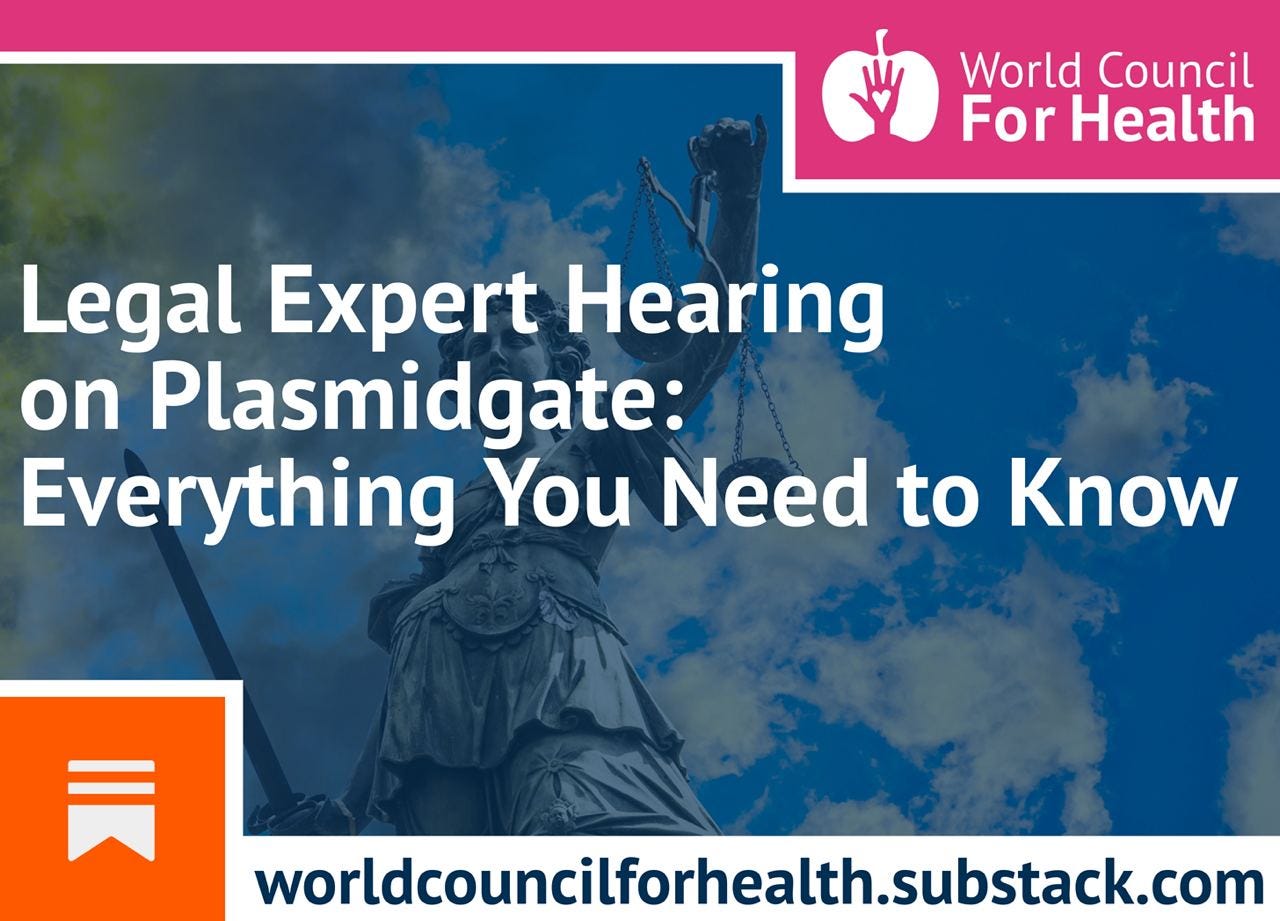



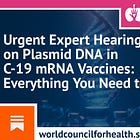
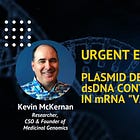
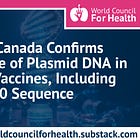
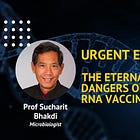

Such valuable hard work. You are fully appreciated. Thank you
Attorney General Ken Paxton @KenPaxtonTX
BREAKING:🚨 I am suing Pfizer for misrepresenting Covid-19 vaccine efficacy and conspiring to censor public discourse.
https://twitter.com/KenPaxtonTX/status/1730301900669505942?cn=ZmxleGlibGVfcmVjcw%3D%3D&refsrc=email